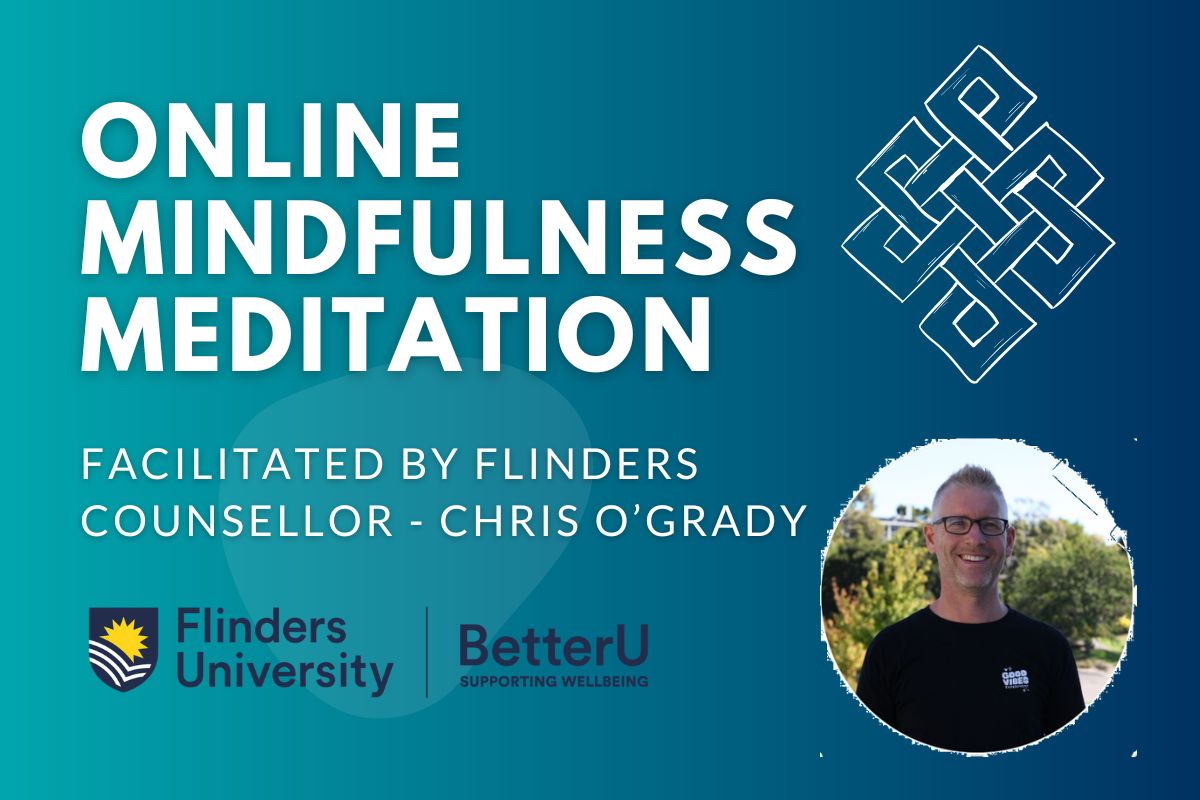
Take a 15-minute mindful pause with Flinders Counsellor Chris O’Grady in these free, drop-in online meditation sessions. No experience needed, just a moment to breathe and be present.
CLICK HERE TO REGISTER & GET YOUR LINK
WHEN: Every Tuesday 12:00pm – 12:15pm (ACST)
LOCATION: ONLINE – Microsoft Teams – CLICK HERE TO REGISTER & GET YOUR LINK
FOR WHO: All Flinders students and staff
Mindfulness is paying attention to the present moment with an attitude of openness, curiosity, and acceptance. Regular practice can help us better manage stress and anxiety, improve focus, engage more fully in life, and take effective action.
These weekly drop-in online meditation sessions are an opportunity to pause and offer yourself 15 minutes to get present and grounded. Led by Flinders counsellor Chris O’Grady, these guided sessions invite you to practice increasing your awareness of your experience in the present moment, in a supportive online community. Join regularly or for a one-off session.
Facilitated by Flinders Counsellor Chris O’Grady

What is mindfulness?
Mindfulness is awareness that arises through paying attention, on purpose, in the present moment, non-judgementally – Jon Kabat-Zinn
Whenever we worry about the future or go over events from the past, we are not really living in the present moment. This can also happen when we are completing tasks, but our mind is distracted or ‘elsewhere’. Common examples of ‘not being in the present moment’ can look like:
- Procrastinating about getting something done
- Worrying about a future task or event
- Ruminating about something unpleasant that has happened in the past.
Of course, there are times when we do need to plan for the future or reflect on the past. It is also natural for our minds to lose focus and wander at times. However, if we spend too much time caught up in our thoughts or feelings rather than being present with current activities, we function as if on ‘autopilot’: the body is in one place, but the mind is in another.
Too much time on ‘autopilot’ can result in falling into repeated patterns of thinking and reacting which can be unhelpful in the longer term. Not being in the present can also lead to a lack of engagement in life and loss of connectedness to others.
What is mindfulness meditation?
Mindfulness meditation involves learning to counteract the tendency for the mind to wander away from the present. We use a point of focus (often the breath) to learn to ‘train the brain’ to become more aware of the present, more easily. We do this with kindness and compassion for ourselves, learning to let go of judgements and finding new ways of responding when we encounter our habitual patterns of thinking and behaving.
What are the benefits of meditation?
Mindfulness has been shown to have significant benefits in terms of stress reduction and a range of health improvements. It is not a ‘quick fix’ solution and requires investment of time and energy. The ‘payoff’ for this can be transformative.
Some potential benefits for students (and in more general populations) include:
Reduced symptoms of stress and emotional distress. In students, this has been achieved even around exam time.
Increased awareness of the present moment, leading to enriched sensory experience.
Improvements in attention and concentration.
Improved health, such as increased immune response, and decreased inflammation, stress hormones, and blood pressure.
The amount of mindfulness meditation practice appears to have a relationship with the benefits, with research indicating that around 20 minutes of daily practice can lead to the effects above.
Tips for practising mindfulness meditation
Mindfulness is about being open to and accepting of our present experience. Since this can be challenging, it takes practice! Here are some of our top tips for practising mindfulness meditation:
- Mindfulness meditation is best learned from guided practice, so listening to a recording or attending a live practice is recommended.
- It is best to set aside time where you do not expect to be interrupted.
- There is no right or wrong way to practice mindfulness!
- There is no outcome to be achieved – we are not even trying to relax, although this can happen.
- The main intention with each mindfulness practice is to be present with whatever our experience is.
Important
These forms of meditation may not be suitable for those who have experienced psychosis, are currently experiencing significant levels of depression or who have a history of traumatic experiences. Under these circumstances, it is best to seek the guidance of a counsellor.
If you begin to feel ‘lost’ or extremely uncomfortable during the practice – you can bring yourself out of it by gently opening your eyes, gradually moving your body, and reconnecting with the physical world around you.
Support
Please reach out to your usual professional supports or one of the counsellors at the Flinders Counselling Service if you have any questions or would like any further support.
Mindfulness for Academic Success
Mindfulness for Academic Success is a 5-Week evidence-based wellbeing program designed for university students.
This innovative program consisting of five 60-minute sessions over five weeks. During these sessions you will learn to use mindfulness to:
- reduce stress and anxiety
- improve focus
- stop procrastinating
- communicate more effectively
- study and work more efficiently (and with more enjoyment).
Please click here for more information and to apply.

